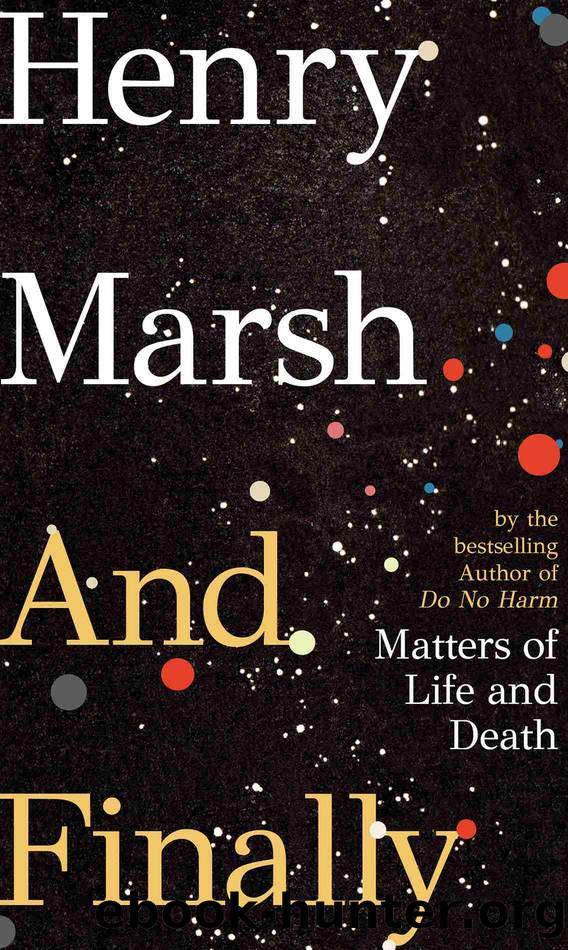And Finally by Henry Marsh

Author:Henry Marsh [Marsh, Henry]
Language: eng
Format: epub
ISBN: 9781473560970
Publisher: Random House
Published: 2022-07-08T00:00:00+00:00
12
I do not want to die â but then, who does? But nor, to state the obvious, do I want to become old and decrepit. It used to be thought that human life came with a fairly specific time limit and that there was something ânaturalâ about dying in your seventies, but trying to arrest or even reverse ageing is now serious science, and no longer the exclusive preserve of cranks or quacks. We are part of Nature, and everything we do â including all the technology that is so much a part of human life â is as natural as sex and trees. It is no good saying that trying to extend human life is against Nature, though whether it is sensible or not is a different matter. I find the idea of extending human lifespan appalling but canât deny it is a prejudice on my part, which I must overcome, if only to understand the science behind it.
There are enormous differences in the lifespans of different creatures â from insects that might live a matter of hours to Greenland sharks and bowhead whales that can live for hundreds of years. Some â like the Galapagos tortoise â show few signs of ageing even in old age. There are various theories as to why we age, but they all must be accounted for in terms of evolution and natural selection, in accordance with Theodosius Dobzhanskyâs famous dictum in 1973 that ânothing in biology makes sense except in the light of evolutionâ.
One of the main theories of ageing is âantagonistic pleiotropyâ â in simple terms, of evolutionary neglect. It is now understood that the same gene can have different effects â pleiotropy â in different circumstances. A gene which increases reproductive success in youth may have a damaging effect in later life. But this gene will be selected for and spread, despite resulting in cellular decay later in the organismâs life. Evolution by natural selection is simply a mechanism, but I am unable to avoid the pathetic fallacy of attributing purpose and intent to it. Natural selection has no interest in the sufferings of old age. It has abandoned me.
There are exceptions to this â there always are: fish, for instance, and, to some extent, humans, as we live much longer than other primates. Women live well beyond their reproductive age. The most plausible explanation for this phenomenon in humans is the so-called grandmother hypothesis. It seems that humans are unique (although there is evidence that whales might be an exception) in the way that grandmothers are involved in the rearing of the next generation, and it is suggested that this explains our long lifespan compared to other primates. Grandmothers enable their daughters to have more babies and so genes that prolong a grandmotherâs life will be relatively successful compared to those that donât.
Reproduction is not just about having babies, but equally about childcare, and doing our best to see that our children and grandchildren reach reproductive life themselves. If we do not take care to avoid danger and possible death, our children and our genes will not survive.
Download
This site does not store any files on its server. We only index and link to content provided by other sites. Please contact the content providers to delete copyright contents if any and email us, we'll remove relevant links or contents immediately.
Hit Refresh by Satya Nadella(9134)
When Breath Becomes Air by Paul Kalanithi(8447)
The Girl Without a Voice by Casey Watson(7889)
A Court of Wings and Ruin by Sarah J. Maas(7847)
Do No Harm Stories of Life, Death and Brain Surgery by Henry Marsh(6941)
Shoe Dog by Phil Knight(5268)
The Rules Do Not Apply by Ariel Levy(4969)
A Higher Loyalty: Truth, Lies, and Leadership by James Comey(4964)
Hunger by Roxane Gay(4928)
Tuesdays with Morrie by Mitch Albom(4784)
Everything Happens for a Reason by Kate Bowler(4743)
The Immortal Life of Henrietta Lacks by Rebecca Skloot(4588)
Millionaire: The Philanderer, Gambler, and Duelist Who Invented Modern Finance by Janet Gleeson(4478)
How to Change Your Mind by Michael Pollan(4356)
All Creatures Great and Small by James Herriot(4322)
The Money Culture by Michael Lewis(4207)
Man and His Symbols by Carl Gustav Jung(4135)
Elon Musk by Ashlee Vance(4127)
Tokyo Vice: An American Reporter on the Police Beat in Japan by Jake Adelstein(3996)
